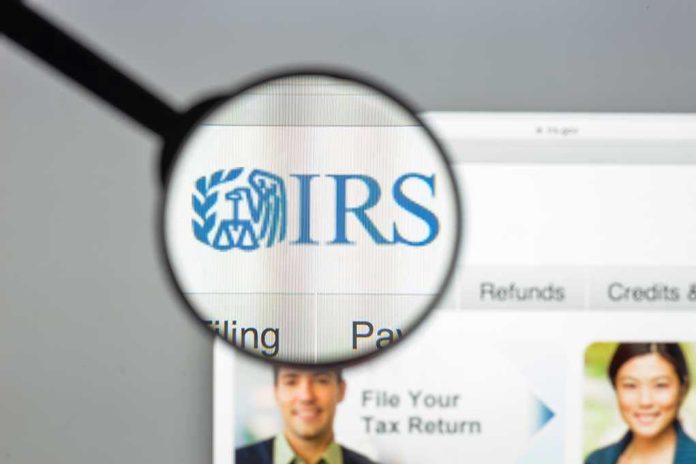
When the nation’s most scrutinized law enforcement agency places a whistleblower at its helm and hands him the keys to investigations with political dynamite, every American with a tax return and a pulse should pay close attention.
Story Snapshot
- Gary Shapley, newly named Deputy Chief of IRS Criminal Investigation, pledges to keep politics out of tax enforcement.
- Shapley’s whistleblower role in the Hunter Biden case sets the stage for his public commitment to impartiality.
- The IRS faces mounting pressure to prove its independence as it modernizes enforcement and expands globally.
- Shapley’s leadership could reshape the agency’s reputation and strategy for years to come.
Shapley’s Appointment Signals New Era for IRS Criminal Investigations
Gary Shapley’s elevation to Deputy Chief of IRS Criminal Investigation marked a decisive moment for the agency. The announcement arrived amid increasing public skepticism about the IRS’s ability to remain apolitical, especially as the division’s work routinely collides with the most volatile issues in American politics. Shapley’s record as a whistleblower in the Hunter Biden investigation has already ensured that his tenure will not escape public scrutiny, but his on-the-record commitment to evidence-based enforcement stands apart from generic promises of agency neutrality.
Incoming IRS criminal chief says evidence, not politics, will guide tax probes https://t.co/2Ag8vJsLp2
— PNW Dems (@PNWDems) November 11, 2025
Immediately after taking office, Shapley began overseeing 20 domestic field offices and 14 foreign posts, commanding more than 2,000 special agents. His leadership style, shaped by years of experience pursuing international financial crimes, signals a shift toward data-driven, globally coordinated enforcement. The IRS Criminal Investigation division, often seen as the watchdog of America’s financial system, is now in the hands of someone who has publicly resisted calls for favoritism and political targeting. In interviews, Shapley stated that even if pressed by a presidential administration to investigate political opponents, he would refuse unless the evidence demanded it.
IRS Independence Tested by Political Headwinds
The IRS Criminal Investigation division has always operated with the mandate to enforce tax laws impartially, but reality often tests that ideal. High-profile investigations, such as those involving conservative nonprofits in 2013 or political figures like Hunter Biden, have repeatedly forced the agency into the national spotlight. Shapley’s appointment comes as the IRS faces renewed congressional oversight and media attention. Chief Guy Ficco, Shapley’s direct superior, has publicly praised his international expertise and leadership, reinforcing the agency’s message that enforcement decisions should rest solely on facts, not affiliations.
The stakes could hardly be higher. With partisans on both sides eager to claim bias or favoritism, even the appearance of political influence risks undermining public trust. IRS-CI’s modernization efforts—adopting new technology, targeting global financial threats, and collaborating with international partners—are all happening under this microscope. Shapley now sits at the intersection of technical innovation and political expectation, tasked with proving that the agency can pursue tax evasion wherever it leads, regardless of who is involved.
Repercussions for Politics, Professionals, and the Public
Shapley’s stance has immediate and long-term implications. In the short term, every investigation touching a political figure will be watched and dissected for signs of bias. The media’s focus on Shapley’s whistleblower status and explicit statements about resisting political pressure means that any deviation from evidence-based enforcement will not go unnoticed. IRS personnel, already under stress to demonstrate impartiality, now operate in an environment where transparency and independence are paramount.
For the broader public, Shapley’s leadership could restore—or further challenge—confidence in America’s tax enforcement. If his commitment to impartiality holds, IRS-CI may set a precedent for how law enforcement agencies handle politically sensitive cases. Economic impacts include potentially greater compliance, higher revenues, and a shift in how legal and accounting professionals advise clients. Socially and politically, the story becomes a litmus test for the credibility of American institutions: can the IRS prove itself immune to partisan pressure, or will its actions become fodder for the next national controversy?
Expert Analysis and the Road Ahead
Industry analysts and academic experts agree that the IRS’s reputation hinges on its ability to remain above politics. Shapley’s direct quotes and the consistency of his statements across major news outlets lend credibility to his promises. Chief Ficco’s endorsement and the agency’s organizational transparency further reinforce the narrative. However, some legal scholars caution that in today’s polarized environment, complete insulation from political influence remains aspirational. Critics question whether any leader, however committed, can resist the myriad pressures that come with investigating the powerful.
Cross-referencing IRS press releases, CBS News interviews, and industry publications reveals a rare consensus: Shapley’s background, role, and stated objectives are clear and consistent. No major factual contradictions appear among authoritative sources. The effectiveness of his approach, however, will be measured not just by what he says, but by what the IRS does next—especially when the stakes are highest, and the evidence is not so clear-cut.
Sources:
Gary Shapley named Deputy Chief of IRS Criminal Investigation
IRS-CI names Gary Shapley as Deputy Chief
IRS Criminal Investigation (Wikipedia)
Incoming IRS criminal chief vows to keep politics out of tax investigations (CBS News)
CBS interview with Gary Shapley
IRS whistleblower Gary Shapley: IRS criminal chief, Trump’s enemies (CBS News)



